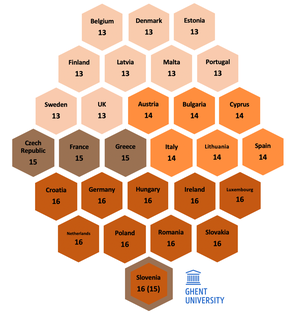A children’s rights perspective on privacy and data protection in the digital age
Research project ‘A children’s rights perspective on privacy and data protection in the digital age: a critical and forward-looking analysis of the General Data Protection Regulation and its implementation with respect to children and youth’
Promotor: prof. dr. Eva Lievens
Researcher: Ingrida Milkaite
Short description
The research project “A children’s rights perspective on privacy and data protection in the digital age: a critical and forward-looking analysis of the General Data Protection Regulation and its implementation with respect to children and youth” is funded by the Special Research Fund Ghent University and runs from 2017 to 2021. The research essentially aims to examine whether and how the right to privacy and data protection for children and youth in the digital age should be re-thought.

One aspect of the current research focuses on Article 8 of the General Data Protection Regulation (GDPR) which contains specific requirements regarding consent for the processing of personal data of children. The general rule provides for a parental consent requirement for all youth under 16 years old in situations where information society services are offered directly to them, and consent is the lawful ground on the basis of which the data is processed. However, Member States may choose to deviate and decide to lower the age threshold to 15, 14, or 13 years. Our research into different national approaches, based on official and public documents, shows that the implementation of article 8 GDPR is not only fragmented across the EU (see figure on the right), but also that certain governments changed their minds along the way.
Council of Europe Stefano Rodotà award
In January 2019, this research project was awarded the first edition of Stefano Rodotà award established by the Council of Europe Committee of Convention 108 which intends to reward innovative and original academic research projects helping to advance data protection reflections.
The award has been given in honour and memory of Stefano Rodotà, a prominent Italian lawyer and politician who devoted much of his life to the promotion of the right to data protection. In the context of the award, Ingrida Milkaite and Eva Lievens had two outstanding opportunities to present their research to, firstly, the CoE Bureau of the Committee of Convention 108 in Paris in March 2019 and, secondly, the CoE Committee of Convention 108 in Strasbourg in June 2019.
Selection of publications
- Ingrida Milkaite and Eva Lievens, ‘Child-Friendly Transparency of Data Processing in the EU: FromLegal Requirements to Platform Policies’ (2020) 14 Journal of Children and Media 1.
- Simone van der Hof, Eva Lievens and Ingrida Milkaite, ‘The Protection of Children’s Personal Data in a Data-Driven World: A Closer Look at the GDPR from a Children’s Rights Perspective’ in Ton Liefaard, Stephanie Rap and Peter Rodrigues (eds), Monitoring Children’s Rights in the Netherlands. 30 Years of the UN Convention on the Rights of the Child (Leiden University Press, 2020)
- Ingrida Milkaite and Eva Lievens, ‘Children’s Rights to Privacy and Data Protection Around the World: Challenges in the Digital Realm’ (2019) 10 European Journal of Law and Technology
- Ingrida Milkaite and Eva Lievens, ‘The GDPR Child’s Age of Consent for Data Processing across the EU – One Year Later (July 2019)’ (Better Internet for Kids, 2019)
- Ingrida Milkaite and Eva Lievens, ‘The Internet of Toys: Playing Games with Children’s Data?’, in Mascheroni Giovanna and Holloway Donell (eds), The Internet of Toys: Practices, Affordances and the Political Economy of Children’s Play (Palgrave Macmillan, 2019)
- Eva Lievens, Simone van der Hof, Ton Liefaard, Valerie Verdoodt, Ingrida Milkaite, Thijs Hannema, ‘Submission to the Committee on the Rights of the Child in View of Their Intention to Draft a General Comment on Children’s Rights in Relation to the Digital Environment. The Child Right to Protection against Economic Exploitation in the Digital World’ (2019)
- Ingrida Milkaite and Eva Lievens, ‘Towards a Better Protection of Children’s Personal Data Collected by Connected Toys and Devices’ (Digital Freedom Fund, 3 December 2018)
- Ingrida Milkaite, Valerie Verdoodt, Hans Martens, Eva Lievens, ‘The General Data Protection Regulation and Children’s Rights: Questions and Answers for Legislators, DPAs, Industry, Education, Stakeholders and Civil Society. Roundtable Report’ (2017)
